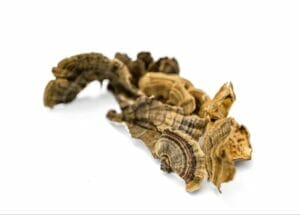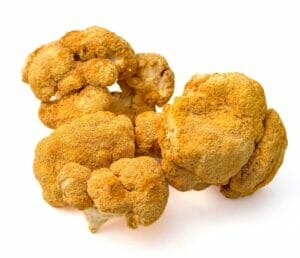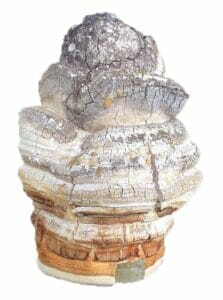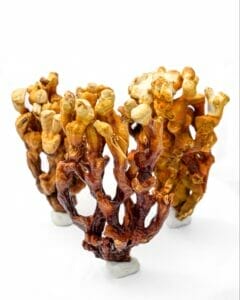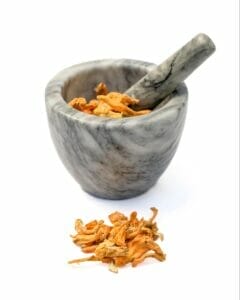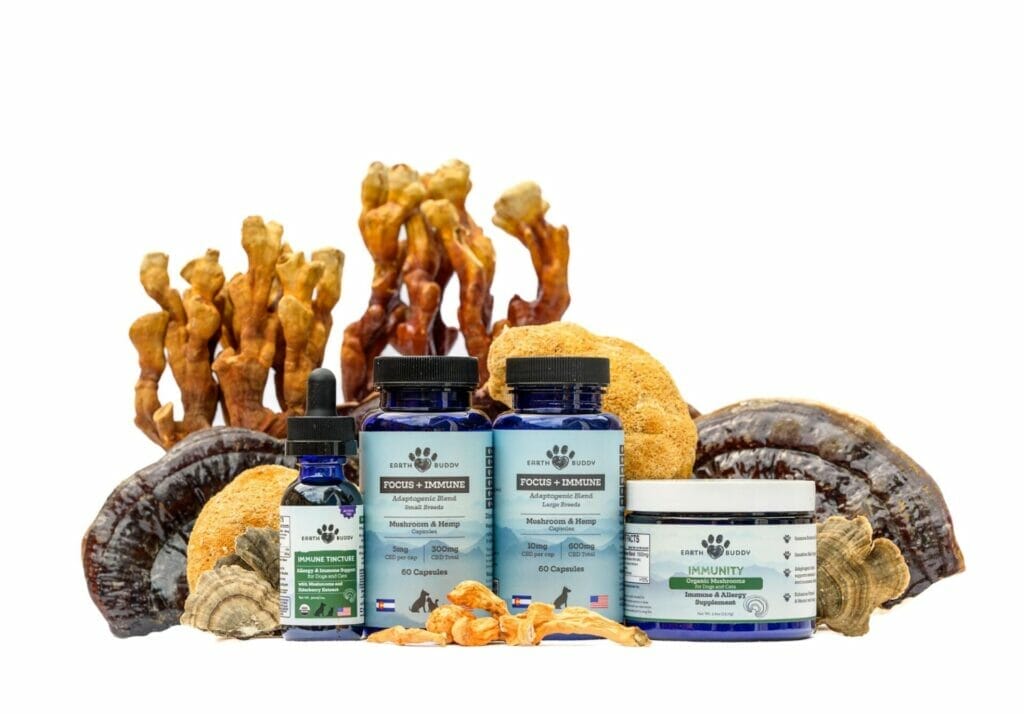Can Dogs Eat Mushrooms? More Medicinal Mushrooms for Dogs
September 14, 2023
Written By: Earth Buddy Team

Mushrooms are fungi that come in various species, each with its own set of nutrients and potential effects on a dog’s health. While there are edible mushrooms that can be incredibly beneficial to your dog’s health and wellness, others can be toxic and result in mushroom poisoning in dogs. Therefore, understanding the specifics is crucial when considering mushrooms as a part of your dog’s diet.
Can Dogs Eat Mushrooms?
Can dogs eat mushrooms? As a general answer: yes, dogs can eat edible mushrooms. Some types of mushrooms are safe for dogs to consume and may even offer health benefits, including those considered medicinal. However, caution is paramount when giving mushrooms to your pet to prevent mushroom toxicity. It’s important to do your research on any product you’re considering to ensure it’s safe and healthy.
Medicinal Mushrooms for Dogs
Medicinal mushrooms have garnered significant attention in the field of veterinary medicine for their potential health benefits for dogs. Edible mushroom varieties such as Reishi, Turkey Tail, Shiitake, and Cordyceps have been studied for their therapeutic properties. Here’s a brief overview of each mushroom type:
Turkey Tail Mushrooms for Dogs
Turkey Tail mushrooms (Trametes versicolor) have gained considerable interest in veterinary medicine due to their potential health benefits for dogs. These fungi are rich in bioactive compounds like polysaccharides, specifically polysaccharopeptide (PSP) and polysaccharide-K (PSK), which have immune enhancing effects. Turkey Tail also contains antioxidants that help decrease oxidative damage and may help protect body cells and tissues.
The therapeutic potential of Turkey Tail mushrooms for dogs and cats extends beyond just the fruiting body; the mycelium, or the fungal root system on which the mushroom grows, also has notable health benefits. Extracts from the mycelium alone can offer essential immune enhancing effects. Therefore, a comprehensive approach to using Turkey Tail mushrooms as a supplement should ideally include both the fruiting body and the mycelium to maximize health benefits.
The benefits of Turkey Tail for dogs include:
- Enhances immune response
- Assists in the digestion and absorption of essential nutrients
- Helps maintain a normal inflammatory response
- Promotes the body’s innate ability to resist pathogens
- Helps maintain normal liver and kidney function
- Helps support normal respiratory function and health
- Helps to maintain normal histamine levels
- May help with occasional or seasonal allergies
Lion’s Mane Mushrooms for Dogs
One of the most notable advantages of Lion’s Mane for dogs is its cognitive support. The mushroom is known to stimulate the production of nerve growth factor (NGF), a protein that is essential for the maintenance and growth of neurons in the brain. This is particularly beneficial for aging dogs that might be experiencing cognitive decline. It can also be a proactive measure to support normal brain and nerve function.
.
Lion’s Mane has also been studied for its ability to support normal nerve conduction and memory recall, which means it could reduce the negative effects of oxidative stress. Its high antioxidant content makes it effective in supporting normal bodily functions. Antioxidants have been shown to aid in the elimination of unstable oxygen molecules called
free radicals.
Besides cognitive benefits, Lion’s Mane helps maintain normal emotional balance, although these effects are not as thoroughly researched in dogs as they are in humans. However, the adaptogenic properties of the mushroom may help regulate cortisol levels, thereby helping dogs that are exhibiting nervousness, hyperactivity, discontentment or responding to
environmentally-induced stress.
To summarize, if your dog ate Lion’s Mane, they could experience the following benefits:
- Help support cognitive function
- Supports normal nerve conduction and memory recall
- Promote a sense of relaxation and mental alertness without drowsiness
- Have a calming effect on nerves
- Help eliminate free radicals associated with the aging process
- Provide nutritional support for healthy immune function
- Helps maintain physical and mental well-being
Agarikon Mushrooms for Dogs
Agarikon mushrooms (Fomitopsis officinalis) are an ancient fungal species that have been traditionally used for their medicinal properties, especially their potential immune enhancing abilities. They grow primarily on the trunks of conifer trees and are native to the forests of North America and Europe. In recent years, they have gained attention for their potential application in veterinary medicine, particularly for dogs.
Agarikon mushrooms are rich in polysaccharides, specifically beta-glucans, which are known to support a healthy immune system in all animals. These compounds can enhance the immune response.
Overall, if your dog ate agarikon mushrooms, they could experience the following benefits:
- Supports normal cardiovascular, immune and neurological function
- Provides antioxidant support
- May help relieve inflammation associated with normal daily exercise and activity
- Helps promote normal circulation
- Supports digestive tract health
- Supports normal integrity and function of lungs
- Supports and promotes long-term health
- Helps reduce the effects of normal environmental stress
Reishi Mushrooms for Dogs
Reishi mushrooms (Ganoderma lucidum) have a long history of medicinal use in traditional Eastern medicine, known primarily for helping support the immune system. In recent years, these benefits have extended into the field of veterinary medicine, specifically for dogs.
One of the key active components in Reishi mushrooms are polysaccharides, including beta-glucans, which are well-known for targeting the immune system. These compounds can support immune system function, help support normal detoxification processes, and support pets with seasonal allergies.
Additionally, Reishi mushrooms contain triterpenes, another type of bioactive compound known to have immune enhancing effects. These are often added to help maintain normal, healthy cartilage and joint function.
To wrap it up, the list of potential health benefits includes:
- Enhance cardiovascular function
- Help maintain normal histamine levels
- Help support stamina and endurance
- Promote a sense of relaxation and mental alertness
- Promotes normal detoxification processes
- Supports normal cleansing of the liver from impurities
- Helps support stamina and endurance
Cordyceps Mushrooms for Dogs
Cordyceps mushrooms have long been utilized in traditional Eastern medicine for their multitude of health benefits, ranging from immune support to increased stamina.
One of the primary attributes of Cordyceps is its ability to support energy production and enhance exercise tolerance. This is why it may be recommended for canine athletes as well as senior pets. The mushroom helps support energy production at a cellular level and enhances oxygen utilization.
Immune support is another notable benefit of Cordyceps. The mushroom contains various bioactive compounds, including polysaccharides and beta-glucans, known to help keep dogs in peak condition.
The multitude of potential health benefits of cordyceps for dogs include:
- Supports normal physical and mental performance
- Supports normal recovery time after strenuous activity
- Helps maintain normal pulmonary health
- Supports normal integrity and function of lungs
- Helps eliminate free radicals associated with the aging process
- Support a healthy immune system in all animals
- Helps support heart function
- Supports normal heart and vasculature functioning
- Helps muscle function and fluid balance
- Enhances renal function
- Supports normal kidney detoxification
- Helps keep dogs in peak condition
Dosing Medicinal Mushrooms
Determining the correct dosage of medicinal mushrooms for dogs involves several factors, including the type of mushroom, the form of the supplement (e.g., powder, capsule, or tincture), the dog’s weight, age, and overall health status. Initially, it’s often recommended to start with a smaller dosage to observe how your dog reacts, gradually increasing it to the recommended level. Aim to administer the supplement at the same time every day for the best results.
Many pet owners find it easiest to mix mushroom powders or liquid tinctures with their dog’s food. Ensure you mix it thoroughly so your pet ingests the entire dose. Capsules can often be given directly, like any other pill, or you can open the capsule and mix the powder with food. Remember, while medicinal mushrooms may offer health benefits, they are not a substitute for a balanced diet and appropriate veterinary care.
Store Bought Mushrooms
A common question is, “Can dogs eat mushrooms from the store?” Generally, some types of plain, cooked, store bought mushrooms are considered safe for dogs to eat in moderate quantities. These types include:
- White button mushrooms: These are the most commonly available mushrooms and are generally safe for dogs when offered as cooked mushrooms.
- Cremini mushrooms: These are essentially baby portobello mushrooms and are also considered safe for dogs when cooked.
- Portobello mushrooms: These are fully grown cremini mushrooms and, like their younger counterparts, are typically safe for dogs when cooked.
- Shiitake mushrooms: While generally safe for humans and also used in some medicinal supplements for dogs, they should be given in moderation, and ideally, you should offer cooked mushrooms.
- Oyster mushrooms: These store bought mushrooms are generally safe for dogs when cooked but should be offered in moderation.
If you choose to feed mushrooms to your dog from the store, perhaps from a recent grocery trip, it’s important to feed them without additives like butter and spices.
Can Dogs Eat Mushrooms From The Store?
It’s generally considered very risky for dogs to eat wild mushrooms. While some types of wild mushrooms are non-toxic, a significant number can cause mushroom toxicity, which can be extremely harmful or even fatal to dogs. Identification of wild mushrooms can be extremely difficult and should be left to experts.
Even experienced mycologists, people who study fungi, sometimes struggle to identify toxic mushrooms. This means it may be especially difficult for the average dog lover to know the difference between safe and toxic varieties. If you aren’t an expert, err on the side of caution and keep your dogs away from wild mushrooms during walks and outdoor activities.
Mushrooms Poisonous to Dogs: Toxic Mushroom Species
Some mushroom species are highly toxic and can result in severe symptoms or even death, especially Amanita mushrooms. The most toxic mushroom species include the following::
- Amanita phalloides (Death Cap mushroom)
- Amanita muscaria (Fly Agaric)
- Amanita pantherina (Panther Cap)
- Amanita gemmata (Jeweled Deathcap)
- Galerina marginata (Autumn Galerina or Funeral Bell)
- Inocybe spp. (Fibercaps)
- Gyromitra spp. (False Morels)
- Clitocybe dealbata (Ivory Funnel)
- Scleroderma citrinum (Common Earthball)
- Cortinarius spp. (Webcaps)
- Paxillus involutus (Brown Roll Rim)
- Lepiota (Dapperlings)
- Entoloma spp.
- Hebeloma spp.
- Orellani (including Cortinarius orellanus and Cortinarius orellanoides)
This list of toxic mushrooms is not comprehensive, and it’s important to note that identification of wild mushrooms can be difficult. And although many types of mushrooms in the grocery store are safe for your dog, you should never feed them anything without first knowing what it is.
Symptoms of Mushroom Poisoning in Dogs
If you suspect that your dog ate toxic mushrooms, immediate and appropriate action is crucial. Symptoms of mushroom poisoning include:
- Vomiting
- Diarrhea
- Seizures
- Lethargy
- Loss of coordination
Don’t panic if your dog eats wild mushrooms. If you panic, they will sense it, which could make matters worse. If your dog eats a wild mushroom, if there are any pieces of the poisonous mushrooms left in your dog’s mouth, remove them carefully and get as much as you can out of their mouth.
If possible, collect a sample of the poisonous mushrooms that your dog ingested so your vet knows which mushroom species gave your dog mushroom poisoning. Use gloves, and place the sample in a paper bag for identification. Photos can also be useful for identification purposes.
Immediate veterinary care is essential if you suspect that your dog has ingested toxic mushrooms. You should also call the Animal Poison Control Center for advice regarding what you should do until you reach the vet’s office. The phone number to reach the ASPCA’s poison control is (888) 426-4435. They will ask you about the symptoms of mushroom poisoning you’re noticing and will guide you on what steps to take next.
Never try to induce vomiting unless specifically instructed to do so by a veterinarian. Some toxic mushrooms can cause more harm, worsening mushroom poisoning in dogs if vomited back up.
Why Full Spectrum Products For Dog Mushrooms Supplements
The idea of giving a full-spectrum mushroom product containing both mycelium and fruiting body to your dog is based on the concept that different parts of the mushroom contain different beneficial compounds, thereby offering a broader range of health benefits when used in combination.
The mycelium, the vegetative part of the fungus, contains a variety of enzymes, antioxidants, and polysaccharides that can support the immune system and maintain a normal inflammatory cytokine cascade. The fruiting body, which is the above-ground part of the mushroom that most people are familiar with, also contains beneficial compounds like beta-glucans, triterpenes, and vitamins.
By providing a full-spectrum supplement, you’re ensuring that your dog benefits from a diverse range of these nutrients and bioactive compounds. This could potentially lead to more robust health effects, such as supporting a healthy inflammatory response, maintaining normal GI health and function, and helping keep dogs in peak condition.
Sourcing Functional Mushroom Products
When looking for high-quality medicinal mushrooms for dogs, there are several factors you should consider to ensure you’re providing a safe and effective product.
- Third-party testing: Look for products that have been tested by third-party labs to verify their potency, purity, and safety.
- Species: Make sure that the scientific name of the mushroom species is listed. This ensures that you are getting the specific type of mushroom with the desired medicinal qualities.
- Additives: Check the ingredients list for any unnecessary fillers, artificial flavors, or other additives that your dog might be sensitive to.
- Sourcing: Find out where the mushrooms are sourced from. Even though some wild mushrooms are okay if your dog eats them, they can be contaminated, so it’s better to opt for mushrooms that are organically grown under controlled conditions.
- Full-spectrum: For optimal health benefits, make sure the product contains both the fruiting body and mycelium.
- Transparency: The company you are purchasing the product from should be willing to answer any questions regarding the product. If they are not willing to answer, that should be a red flag.
The mushroom products at Earth Buddy are sourced in the United States from a USDA organic facility. The mushrooms are triple extracted to concentrate the compounds. This results in a more bioavailable product. In other words, your pet’s body is able to absorb the nutrients more effectively when you provide your dog mushrooms. Earth Buddy also has third party testing to show potency and purity.
For further reading, we recommend:
- https://www.ncbi.nlm.nih.gov/pmc/articles/PMC7663060/
- https://www.ncbi.nlm.nih.gov/pmc/articles/PMC10183216/
- https://bmccomplementmedtherapies.biomedcentral.com/articles/10.1186/s12906-019-2681-7
- https://pubmed.ncbi.nlm.nih.gov/24266378/
- https://www.ncbi.nlm.nih.gov/pmc/articles/PMC5987239/
- https://www.ncbi.nlm.nih.gov/books/NBK92757/
- https://www.ncbi.nlm.nih.gov/pmc/articles/PMC3909570/
- https://www.frontiersin.org/articles/10.3389/fphar.2020.602364/full
- https://www.ncbi.nlm.nih.gov/pmc/articles/PMC10086311/
- https://www.vetmed.wisc.edu/death-cap-mushrooms-pose-threat-to-dogs/
You Might Also Enjoy
Your dog’s skin is their largest organ making dog skin care a crucial part of…
Like us, our dogs, and other mammalian species, cats have an endocannabinoid system. This system…
Learning how to calm a dog down is an essential skill to have in your…

